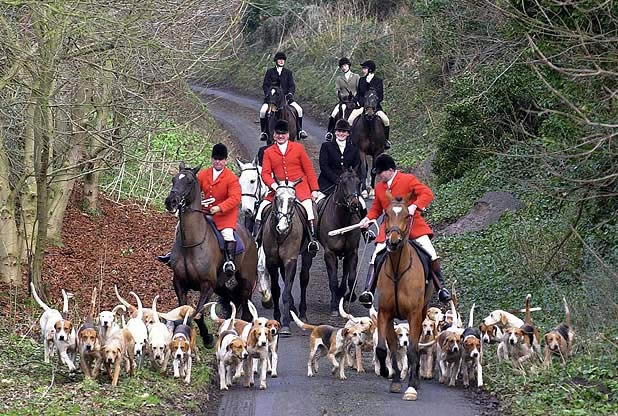
Horseytalk.net Special Interview
Philip Bowern
Call for RSPCA to rethink animal cruelty prosecutions
following review of Heythrop Hunt case

The RSPCA's unique legal position, which makes it both the main investigator and chief prosecutor in animal welfare cases must change, says a top laywer. Philip Bowern reports.
A report urging the RSPCA to revise its policy on prosecuting animal cruelty offenders and to leave cases of alleged illegal hunting to the police and the Crown Prosecution Service has been welcomed by the pro-hunt Countryside Alliance.
Independent lawyer Stephen Wooler, former Chief Inspector of the Crown Prosecution Service Inspectorate, was called in by the animal charity's ruling council in December last year to examine the way the RSPCA conducts court action.
The call came in the wake of complaints about failed hunt prosecutions and alleged political motivation by the charity in pursuing some cases. Dominic Grieve, the Attorney General, suggested in Parliament there was a need for the RSPCA to conduct a review.
But on the most high profile case against a hunt, the Oxfordshire based Heythrop where David Cameron was once a member, the report exonerated the charity's actions.
In Mr Wooler's report on the RSPCA's prosecution activity, he writes: "The Reviewer has no doubt that the Heythrop Hunt case was appropriately brought."
It adds: "The Reviewer found nothing to support the contention of the Countryside Alliance that the prosecution was political, and that the Heythrop Hunt was targeted because it operated within the Parliamentary constituency of the Prime Minister and there were suggestions that he had in the past been associated with the Hunt."
The Charity Commission said in January 2013 that they did not consider that the RSPCA trustees had breached their duty of prudence in the case of this prosecution.
But the Countryside Alliance, a vehement critic of the RSPCA and its status as both investigator and prosecutor in animal welfare cases, said the concerns it expressed about the charity's attitude to prosecutions had been "vindicated" by Mr Wooler's findings.
Director of Campaigns for the CA Tim Bonner said: "Stephen Wooler's report vindicates our position and accepts nearly every concern that we raised in relation to RSPCA prosecutions.
"Unfortunately, however, the review was sabotaged from the start by the RSPCA's refusal to consider whether it should be prosecuting at all. That is the fundamental question which was raised in Parliament and to which the then Attorney General, Dominic Grieve, was referring when he suggested that the RSPCA carry out this independent review.
"Of course the RSPCA can improve the way it prosecutes but the real question is whether it should prosecute at all. Relying on private prosecutions to deliver animal welfare laws is a 19th century solution to a 21st century problem. We remain convinced that it would be better for both animals and people if the RSPCA left prosecution to the CPS.
"If, however, it is determined to continue to act as a campaigning organisation, investigator and prosecutor there must be clarity about its status and role.
"We would therefore endorse Mr Wooler's recommendation that RSPCA prosecutors operate within a statutory framework which would include proper accountability and openness."
Mr Wooler's "over arching findings" in his 140-page report include a call on the charity to update its procedures and work with Government on a more robust animal cruelty prosecutions policy.
"There are several aspects of the RSPCA's enforcement work where change is necessary in order to bring the Society in line with 21st century public expectations and to maintain confidence, particularly by providing accountability and improving transparency," Mr Wooler found.
"It also needs to be more responsive to the increasing incidences of complaints about some actions taken by the Inspectorate and concerns that some of its prosecutions have been inappropriately focussed where little would be achieved; and sometimes on some of the most vulnerable elements of society. The combination of criticism and a relentless media campaign has had an adverse, and in many respects disproportionate, impact on the society's standing.
"Some changes of structure and ethos are needed within the organisation, although many of the problems identified by this review stem from the unsatisfactory infrastructure for enforcement of animal welfare law generally and this needs to be addressed in collaboration with others – government in particular."
Since the departure of chief executive Gavin Grant in February the RSPCA's approach in a number of controversial areas of animal welfare has noticeably softened. In responding to the report RSPCA chairman Mike Tomlinson it would "consider the recommendations and discuss them with other key players".
The charity's online response goes on: "The review...makes 33 recommendations on our investigation and prosecution activity, including
inviting the government to put our investigation and prosecution functions on a more formal basis; seeking statutory appointment of RSPCA inspectors under the Animal Welfare Act 2006; more detailed operational guidance to govern relationships with the police;
the re-alignment of our prosecution role in certain areas such as animal sanctuary cases;
a comprehensive review to be undertaken by us of our prosecutions structure including the adoption of a prosecution policy statement and clearer guidelines on how we assess whether to take prosecutions.
We have already appointed an internal steering group to coordinate our work on responding to the recommendations. Our council will report back in 18 months on the progress we have achieved in responding to the recommendations.
The RSPCA said steps are also being considered to improve the Society's complaints procedure to improve transparency and accountability.





